
 |

|
|
|
|
Height: 5' 10" (1,78 m) Weight: 237 lbs. (107 kg) Hair: brown Eyes: blue Marriage (Apr 5. 1932 - Jun 14. 1977, his death): Ruth Delphine (Finette) Walker (Jun 10. 1909 - Oct 15. 2005) Children: Alan Anthony Reed Jr. (May 10. 1936 - ) Steven Colgate Reed (Aug 29. 1939 - Oct 2. 2019), Christopher "Kit" Robin Reed (Jan 1941 -), Member B’nai B’rith (past president). |
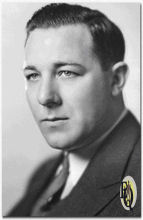 |
| Above right: A young Alan Reed (Teddy Bergman) poses. | |
|
Born as Herbert Theodore Bergman to Jewish parents Henry Bergman, a merchant/lawyer, and Rae Greenberg at 112th Street and St. Nicholas Ave. New York City on August 20. 1907 and nicknamed "Teddy". His father was born in Austria, his mother in Russia. Ted inherited the gift of gab from his father, who later became president of a credit exchange in 1935, known to the staff as "Silver-Tongued Henry." His mother Rae Greenberg (a cousin of Harry Green, the comedian), was all for naming her son after her political idol. Theodore Roosevelt. But there was an Uncle Herman who would have been dreadfully offended if the young one had not been partially named for him—so Ted was tagged Herman Theodore and subsequently hailed as "Bull." As a child he had one ambition: to go to a boys' camp. However, due to the financial circumstances of his family he was unable to do so. One summer, Teddy's mother managed to gather the necessary funds - only to have them stolen from her on the very day Teddy was supposed to depart for camp. Although reportedly a confirmed pessimist since his grammar school days, Teddy enjoyed a fairly happy youth. Although in one newspaper article he mentioned one of the most dramatic and impressing moments of his life:"... when he was out in a row boat with his father and mother in Bronx Park during a storm". Ever since Ted saw Lon Chaney's performance as a misformed, brain-twisted cripple in The Penalty (Goldwyn, Jul 30. 1920), the first of Chaney's great impersonations, he was one of his greatest admirers. When fifteen, his penchant for mimicry began to manifest itself. He constructed a crude stage in the basement of the Bergman home, where other children of the neighborhood would be admitted for two pennies, a top, or anything else of value to the youthful impresario - who was the entire cast of these "Bergman Imitate Shows". Young Ted with his impersonations of the German butcher on the corner, or the Chinese laundryman in the middle of the block, or the Italian ice-man, all with genuine recognizable dialects, won each of these theatrical encounters handily. His next job was to mind his baby brother, which he strangely enough, enjoyed. The baby brother was given to chronic crying spells and Ted was the only family member amble to quiet him. He did so by repeating his afternoon's performance. As a youth he made vacation wanderings as a deckhand on transatlantic vessels. It was here that Reed supposedly developed his knack for imitating dialects.
Reed attended Washington High School (now George Washington Educational
Campus). When he got the role of Shylock in Washington High's dramatization
of The Merchant of Venice, Teddy got the footlight urge at the same
time. Young Teddy wasn't
much interested in stealing apples, hustling nickels, or evading the truant
officer. He was a bookish boy who excelled in school, graduating from high
school a year ahead of schedule. At Columbia University Ted sold subscriptions to magazines to work his way through college. He became the intercollegiate broad-jumping champion and also won the Eastern Intercollegiate Heavyweight wrestling title in his senior year. He also wrote college plays, just to prove that a brawny arm could swing a delicate pen. Performing in the annual varsity show he was spotted by Ralph Rose, an Oklahoma candy tycoon and dropped out of school. He set out to find jobs on the stage he landed a couple of walk-ons, but was obliged to earn his bread and butter in between polishing brass work on steam ships, instructing in a gymnasium and driving a truck. So his first job in the show business was with the Ralph A. Rose Stock Company in Oklahoma City, where he portrayed Pierre of the Plains, which lasted one season (3 weeks). Next he headed for the Provincetown Playhouse in Massachusetts where he learned the rudiments of the stage and honed his acting talents in a cycle of sea plays by Eugene O'Neill, the same plays which later were made into a movie The Long Voyage Home (United Artists, Oct 8. 1940). After that he tried a whirl behind the scenes as manager and production chief of the New Playwright's Theater, a little theater job which included everything from shifting scenery to shifting lines. Reportedly his first play was a play by John Howard Lawson. This was a good experience, but little theater work didn't pay very well, so Reed took to the vaudeville boards. For several years, Reed toured in vaudeville with both his cousin Harry Green (aka Henry Blitzer, 1892 - 1958) and Bert Gordon. Trouping, he saved a stake of $2,800 and using a small windfall won in a crap game, he went into a business venture with Ralph Rose manufacturing candy praline. However they became granulated when distributed and that put them out of business (1927). Made his debut over WOR in 1927 in The Singing Jailbirds. Four years to a day after his three day incarceration in the Tombs. Again he took to the road in stock companies, touring with What Price Glory, Road to Rome, and others. Times became slack and during the lull Ted put his big bulk to work as physical instructor and manager of a Manhattan gym club. There he taught S. L. "Roxy" Rothafel how to play handball. |
|
![Reed was athletic, as seen on a picture from his acting portfolio. (1950s). (c) Alan Reed Collection [digital resource], Pepperdine University Special Collections and University Archives (Used by permission)](images/Reed_1950s_Pepperdine.jpg) Above: Reed was athletic, as seen on a picture from his acting portfolio. (1950s). © Alan Reed Collection [digital resource], Pepperdine University Special Collections and University Archives (Used by permission) |
|
|
It was inevitable that he would end up in radio where he became a prime announcer. He took his first radio audition in 1929, trying for a gangster part. He didn't get the job, so he went home and called up the director, threatening him in the best gangster idiom. “I’m just gonna tell you somethin’,” he told the shocked producer. “I’m comin’ into your office in a couple of minutes. You’re gonna give me a job, or you’re goin’ for a ride.” Then, he hung up and marched over to the producer’s office. The director was so impressed that when he heard who was calling he gave Teddy the job after all. So he made his radio debut as Joe the Mug in True Detective Mysteries (CBS, May 16. 1929 - May 8. 1930). On that show, Teddy inadvertently showcased his versatility. He portrayed a spirited young detective, the pride and joy of his father, an old Irish policeman. The role of the policeman was originally played by a seventy-five-year-old with a strong Irish accent. However, during the show, the elderly actor suffered a heart attack and fainted. Teddy swiftly stepped in to fill both roles, expertly mimicking the voice of the old Irishman to such a degree that listeners couldn't discern the switch. News of this feat spread through radio circles, and from then on, Teddy rarely played straightforward roles. Producers and directors found that Teddy could perform proficiently in over twenty dialects and he was kept busy. One of Bergman's lovable characteristics was his fondness for children. Born with an innate ability to handle children he sound found an outlet for this in the capacity of director of a boys' summer camp. So his other job was working at the Copake Country Club (1929 - 1930) as "social director, entertainment producer and actor." "That's where I really learned to be versatile," he once declared. "One night a typical emsee, the next an announcer of a symphony program, then a straight dramatic part; maybe a stooge —just about Anything you can think of." Upon return from camp, health guru Bernarr MacFadden took cognizance of Ted's remarkable physique, and contracted him for air appearances on the Physcial Culture and True Romances Hour (CBS). As of August 1930 Teddy Bergman co-starred as George with Herbert Polesie in Henry and George, a CBS program that featured minute dramas, popular laugh makers interspersed with dance music selections (picture below left). In 1930 he also appeared on Arabesque ("Love in the Desert"). The Chase and Sanborn Hour (Red, Dec 13. 1931 - Apr 8. 1934, min. 7 episodes) was the umbrella title for a series of American comedy and variety radio shows. With song and dance, they clearly imitated the setup of the (once) popular vaudeville acts. Ted would go on appearing in many similar shows. |
|
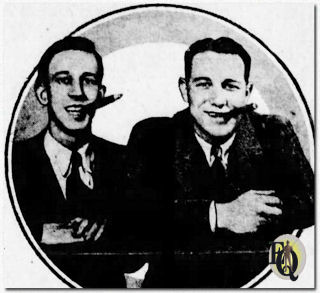 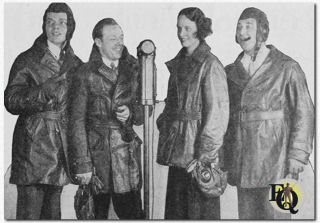 Above left: As early as 1930, Reed (right billed as Teddy Bergman) he co-starred with Herbert Polesie (L) in Henry and George, a CBS program that featured minute dramas, popular laugh makers interspersed with dance music selections. Above right: It is a new, highly amusing Henry and George half-hour that CBS is presenting each Tuesday evening these spring weeks. A new writer, and a reorganized cast. (L to R) Henry is now played by John Brewster; Pete is real life is none other than Billy Scholtz; Flo is portrayed by Georgia Backus; and George by Teddy Bergman. (Apr 1931) |
|
|
The silent-film compilation Chase Me Charlie (Apr 8. 1918) was reissued with sound in 1932, with a new synchronized orchestral score by Elias Breeskin and narration by Teddy Bergman.
Actress, radio singer Finette
Walker (1909 - 2005), appeared on stage in the early
1930s and was a chorus member in the original 1934 Broadway production of
Anything Goes with Ethel Merman.
|
|
| Above right: "Finette Walker, late of the Washington D.C. Opera Company and of the musical revue, "The New Yorkers" is now heard and seen on the synchronized Columbia television and radio stations, W2XAB and W2XE respectively. This twenty year old soprano, sings in French, Spanish and Italian as well as in English" (1929). | |
|
Teddy got his biggest break on The Eddie Cantor Show in 1932. Cantor had spent the past year razzing his orchestra leader, David Rubinoff, who resolutely refused to take a speaking role in the program. Undaunted, Cantor and writer Dave Freedman hired Teddy Bergman to impersonate the Russian-born violinist, giving him a ripe So-we-et accent straight from the steppes. The "Rubinoff" characterization was one of the big hits of the season, and made Teddy Bergman a big name around the studios. (7) Looking for his own recurring character, he created in 1932 the stuttering "Blubber," just one of his many comedic roles, which he debuted in 1933 on the Musical Grocery Store with the Three X Sisters. He tried his best to push Blubber with Blubber Bergman (WGN, Chicago) & The Blubber Bergman Revue (WNEW, New York). Blubber was featured on WOR and WEAF but failed to attract the attention of one of the big chains. In April 1934 he appeared (together with Fred Allen) in The Hour Of Smiles (NBC, Apr 4 - 18. 1934, min. 3 episodes) and in The Fleischmann's Yeast Hour (Red, Jun 28. 1934 - Aug 20. 1936, min. 3 episodes) with Fanny Brice as "Baby Snooks" ... In Circus Night in Silvertown (NBC, Mar - Aug. 1935), a simulated circus show, Teddy Bergman together with Lew Hearn provided the comedy routines. "Bull" as he was known around the Columbia studios, had played more than 800 different character-dialect roles in his eight years in radio. But he's never had such an opportunity to leap agilely from dialect to dialect as he has on Harv and Esther (CBS, Sep 12. 1935 - Mar 5. 1936) sponsored by Harvester Cigars, Ted played 12 different characters in three minutes! Town Hall Tonight (Red, Nov 6. 1935 - Apr 5. 1939, min. 22 episodes) which became The Fred Allen Show in its last season before they moved to CBS as The Texaco Star Theater. |
|
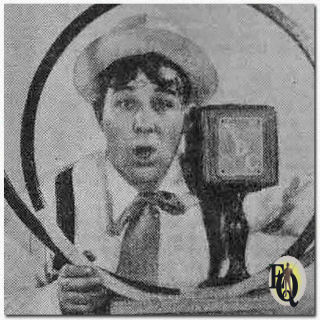 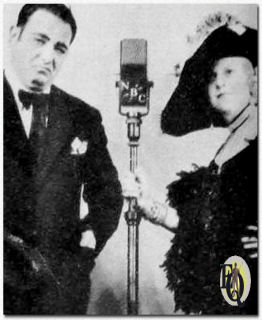 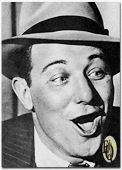 Above left: Looking for his own recurring character, he created in 1932 the stuttering "Blubber," just one of his many comedic roles, which he debuted in 1933 on the Musical Grocery Store with the Three X Sisters. Above middle: Teddy Bergman and Francis Arms in the role of Mr. and Mrs. Rubinoff on the Chase & Sanborn Hour (Radio Stars, Apr 1934). Above right: Harvesters' Teddy Bergman for Harv and Esther (CBS, Sep 12. 1935 - Mar 5. 1936) sponsored by Harvester Cigars. |
|
|
After eight years of stardom in radio, Ted set out to embark on a new development in his career. He was going to sing! He had been secretly taking lessons for three years, believing that a song was an excellent way to close a comedy sequence. "What's your voice like?" Teddy was asked. "It's sort of a cross between a dachshund and a whisky sour baritone," he replied. Teddy made three musical "shorts" Rambling 'Round Radio Row (Vitaphone-Warner, production reel #1632, as "Blubber" Bergman, Apr 21. 1934), Teddy Bergman's International Broadcast (Mentone/Universal, Jun 3. 1936) and Teddy Bergman's Bar-B-Q (Universal, Sep 1. 1937). Alan Reed played Daddy in the earliest appearances of Fanny Brice's "Baby Snooks" on The Ziegfeld Follies of the Air broadcasts of 1936 (CBS, Feb 26. - Jun 6. 1936). He made his debut on the Broadway stage with Double Dummy (John Golden Theatre, Nov 11. - 28. 1936) nine years after he started on radio, through which he had been hear over both major networks, in coast-to-coast hookups, impersonating several hundred characters in 22 dialects. He had a definite flair for comedy and worked under his given name Teddy Bergman.
A House in the Country
(Vanderbilt Theatre, Jan 11. - 31. 1937), |
|
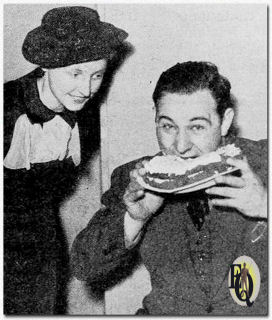 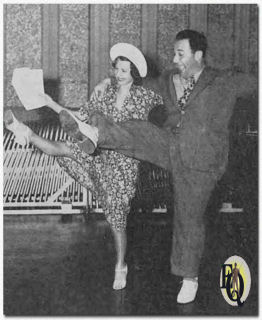 Above left: Teddy Bergman acted as judge of the Home State Food Competition at the Annual Women's Competition of Arts and Industries. He seems to be enjoying the prize-winning Devil's Food cake, as Olive Murphy looks on. (RadioStars, Jan 1936) Above right: Irene Noblette bet Stooge Teddy Bergman that she could kick higher than he could. Such scenes are common to all comedy programs, and especially to the fun-packed Tim and Irene broadcast. (Radio Guide, Jul 1938) |
|
|
In 1938 he landed one of radio's plumiest engagements for a dialectician, becoming a permanent member of Fred Allen's legendary Mighty Allen Art Players. Here was the greatest assortment of dialect talent ever assembled on a single program: diminutive Bridgeportian Minerva Pious offered every sort of nationality imaginable in her feisty, shrill-voiced characterizations. Teddy Bergman replaced the masterful Jack Smart as everything from hyperactive movie executives to flouncing interior decorators. It was the highest-profile job of his career so far, and it began a collaboration with Allen that would last nearly a decade. (7) Now part owner of Camp Copake, a summer spot near Craryville, New York, where he had his first job after leaving college. It's where he spends all his vacations (1938). When directors said "Funny guy, but we need someone more serious here" once to often Bergman got around that roadblock by coming up with a whole new identity for himself, naming himself after his son, Alan Reed* Bergman. "Alan Reed" began to get more dramatic work -- soap operas, nighttime melodramas -- while Teddy Bergman continued to get the comedy work. This bifurcated identity took its toll, however, and to make the bookkeeping easier, the performer finally adopted his pseudonym as his legal name on August 17. 1939. One of the Finest (NBC-Blue, Oct 1939) was the old story of "cops and robbers" with the additional twist of putting a college education into law enforcement. Alan Reed played along with Carleton Young. One episode in November had Reed playing 2 parts. In one role he's cast as a gangster, the other role has him as the cop who's out to get the gangster. So Reed chased himself all the way to Eighth Street. On to New York. Teddy joined up with the Theatre Guild and worked steadily on Broadway. Teddy appeared on Broadway in the William Saroyan play, Love's Old Sweet Song (Plymouth Theatre, May 2. - Jun 8. 1940), his part called for him to have a completely shaven head.
The Texaco Star Theatre
(CBS, Oct 2. 1940 - Apr 20. 1949, min.
113 episodes) generic variety show
with Fred Allen, Milton Berle,... in the lead. The
Fred Allen Show
(NBC, Jan.
31. 1940 - Mar 14. 1948, min. 36 episodes). |
|
He remained a member of Fred
Allen's stock company throughout the war era and, in 1941, Allen gave him
the part he'd been waiting for his whole career -- a role that became,
albeit briefly, a national phenomenon. Allen had, for several years,
featured comic poets of one kind or another in his newsreel segments. Early
in the new decade, one of Reed's distinctive voices began to get these
assignments regularly -- a voice dripping with pompous self-absorption, the
voice of a dignified yet ever so
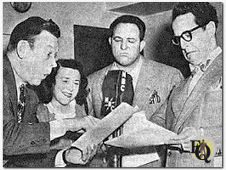 slightly fey artiste. Allen experimented
with various names for this character before settling on the one that
clicked. Throughout the war years, Alan Reed would be best known to radio
listeners as the bard of Allen's Alley
(CBS, Dec 6. - Jun 25. 1942; NBC, Oct 7. 1945 - Dec 28.
1947), Falstaff Openshaw -- and it
was this role that, finally, made him a star. When Allen retired temporarily
due to health issues in 1944, he presented Reed with the legal rights to the
Openshaw character as a gift in recognition of his years of service to the
program -- and Falstaff briefly resurfaced on his own program. Reed would
further capitalize on the character in a popular series of children's
recordings, helping to further cement the threadbare poet's place in popular
culture.
(7) slightly fey artiste. Allen experimented
with various names for this character before settling on the one that
clicked. Throughout the war years, Alan Reed would be best known to radio
listeners as the bard of Allen's Alley
(CBS, Dec 6. - Jun 25. 1942; NBC, Oct 7. 1945 - Dec 28.
1947), Falstaff Openshaw -- and it
was this role that, finally, made him a star. When Allen retired temporarily
due to health issues in 1944, he presented Reed with the legal rights to the
Openshaw character as a gift in recognition of his years of service to the
program -- and Falstaff briefly resurfaced on his own program. Reed would
further capitalize on the character in a popular series of children's
recordings, helping to further cement the threadbare poet's place in popular
culture.
(7) |
|
| Above right: Fred Allen (L) with three of the Alley demimonde (L-R) Minerva Pious, Alan Reed and Kenny Delmar. | |
|
Resident poet "Falstaff Openshaw" always had an appropriate poem for the moment. World War II was blasting in Europe and Openshaw came up with these immortal opening lines of verse: "My little niece is saving grease to help to beat the Japs. To help to beat the Nazis she's collecting bacon scraps...."It goes on and ends with: "When the Axis time at last has come, and the world's restored to peace. The day that Hitler's goose is cooked my little niece will save the grease." (6)
In the fall of 1941 Alan sacrificed
many well-paying radio job to take a role in the stage play Hope for a
Harvest (Guild Theatre, Nov 26. - Dec 27. 1941), with Fredric March. He did this because he hoped movie scouts might
see him in it and offer him what he wanted more than anything in the world -
a Hollywood contract. Back to radio where he was heard as Sol Levy (picture below left) in Abie's Irish Rose (NBC, Jan 24. 1942 - Sep 2. 1944). The Pirate (Martin Beck Theatre, Nov 25. 1942 - Apr 27. 1943) had slightly more success than his previous attempts on Broadway but his talent did not really seem to fit the theater. At one time Alan was doing thirty-five shows a week, which he cut down to fifteen when he started to do character roles in the movies. For years, Reed had been getting offers from Hollywood. Regular as clockwork. Each time Reed had turned them down. "I wanted to make a movie like crazy," he admitted, "but every offer was for a long-term contract. I was too busy to make more than one picture at a time." Then he got his own radio show, and his booming voice rounded up many listeners. The Hollywood offers started pouring in each week. "When RKO came up with a one-picture deal," he said, "I snapped 'em up fast before they could change their minds." In 1943 Alan & his family did move to Beverly Hills. His first picture was Days of Glory (RKO-Radio Pictures, Jun 8 1944) where he played opposite Gregory Peck (picture below right). |
|
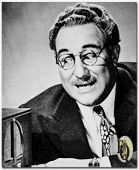 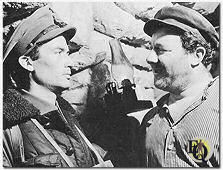 Above left: Alan Reed as Sol Levy in Abie's Irish Rose (NBC, Jan 24. 1942 - Sep 2. 1944). Above right: Gregory Peck & Alan Reed in Days of Glory (RKO-Radio Pictures, Jun 8 1944). |
|
The Cavalcade Of America
(NBC, Oct 29. 1945 - Oct 13. 1947, min. 5 episodes), He played Ezra Liam Kennedy in The Postman Always Rings Twice (MGM, May 2. 1946). Reportedly Alan Reed was called on for some heavy dramatics and in the movie gets one of the worst maulings that's ever been recorded on film, in a scrape with the film's star John Garfield. In 1947 Reed was asked to play the part of Sergeant Velie in radio's The Adventures of Ellery Queen (ABC sustained, Nov 27. 1947 - May 27. 1948).
Fannie Brice played Baby Snooks in such a way
that friends (as well as radio audiences) sometimes find it impossible to
separate the identities of Fannie Brice, the woman, and Baby Snooks, the
invention. |
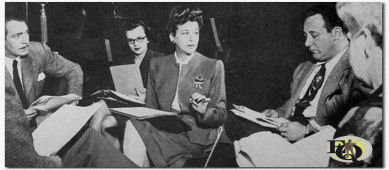 Above: The moment of metamorphosis: Brice (center) becomes Baby Snooks with the help of (from L to R) Daddy Hanley Stafford, script girl Ruth Hahn, Alan Reed (Mr. Weemish, Daddy's boss) and Arlene Harris (Mommy) (CBS, 1947). |
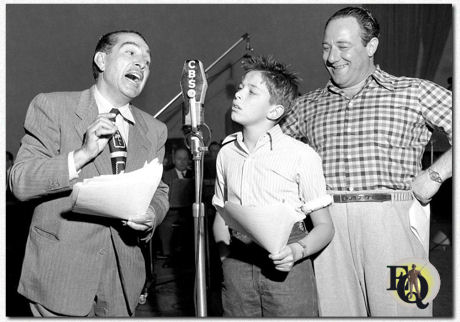 Above: Life with Luigi a CBS Radio program. (L-R), J. Carrol Naish (as Luigi) and Alan Reed, Jr. (as Jimmy O'Connor), discussing Luigis financial affairs. At right, Alan Reed, Sr. (as Pasquale). (Oct 19. 1948) |
|
On radio on My Friend Irma (CBS, Jun 13. 1947 - Jan 5. 1954, min. 28 episodes) he was Mr. Clyde, Irma's boss. On radio's Life With Luigi (CBS, Sep 21. 1948 - Jun 13. 1954, min. 167 episodes) Teddy originated the role of "Pasquale", Luigi's friend and sponsor, proprietor of "Pasquale's Spaghetti Palace" in Chicago and father of fat Rosa whom he was constantly trying to palm off on sweet, good-natured Luigi. Teddy continued in this role when the series went to television. This show alone had perhaps the finest collection of dialects in radio: Swedish, Italian, German all flawlessly acted (see picture above right and below left).
Suspense
(CBS, Apr 17. 1947 - Jan 25. 1959, min. 14 episodes), Of course movies also beckoned, Alan Reed was: Tony, a barber, in Emergency Wedding (Columbia, Nov 15. 1950), Col. LaMartine in the comedy The Redhead and the Cowboy (Paramount, Mar 15. 1951), and Walter Godfrey in Here Comes the Groom (Paramount, Sep 20. 1951). On the dramatic side he played Harry Patullo in Perfect Strangers (Warner Bros, Mar 11. 1950). |
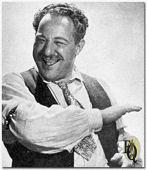 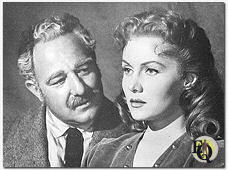 Above left: On radio's Life With Luigi (CBS, Sep 21. 1948 - Jun 13. 1954) Teddy originated the role of "Pasquale". Above right: Teddy Bergman was Col. LaMartine in the comedy The Redhead and the Cowboy (Paramount, Mar 15. 1951) opposite Rhonda Fleming. |
|
Perhaps one of his most-remembered
dramatic roles was that of the famed Mexican Pancho Villa in Viva Zapata
(20th Century Fox, Feb 7. 1952) a movie which had Marlon Brando in the title
role. His astounding abilities and unusual, rather gravelly voice made him one of the busiest actors on both radio and television and movies, to boot. In the highly-popular Duffy's Tavern he played in both radio and TV versions, on radio (Blue, Mar 23. 1943 - Dec 21. 1951, min. 29 episodes) as Clancy the Cop and on television (Syndicated, Feb 23. 1954 - , min. 38 episodes) as the somewhat dim-witted character Finnegan. He also supplied the voice of "Boris" in Disney's Lady and the Tramp (Buena Vista, Jun 16. 1955). In 1955 he founded Alan Reed Enterprises, a sales firm specializing in executive gifts, advertising specialties and wholesale giftwares. Kewtee Bear (1955 or 1956) was co-created by Alan Reed, Bert Stout and Truman Quigley, who together created a unified marketing plan for their fuzzy friend. Kewtee dolls were manufactured by the famed Knickerbocker toy company. Alan narrated a record featuring the bear for the Columbia label. Yours Truly, Johnny Dollar (CBS, Jun 4. 1956 - Dec 20. 1959, min. 16 episodes), Heartbeat Theatre (Salvation Army Syndication, Dec 1. 1957 - Dec 18. 1966, min. 19 episodes). With radio and movies involved, can television be far behind? Alfred Hitchcock Presents (CBS, Nov 11. 1956), Richard Diamond, Private Detective (NBC, Oct. 5. 1959), ... |
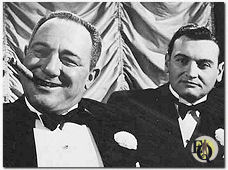 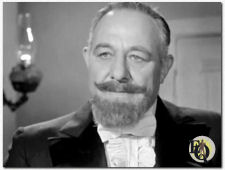 Above left: Alan Reed and Frankie Laine in He Laughed Last (Columbia, Aug 12. 1956). Above right: Alan Reed plays singer's manager Col. Mapleson in the TV-episode of Death Valley Days S8E33, "Emma Is Coming" (Syndicated, May 24. 1960). |
| But Alan Reed will always be mostly remembered with delight as the bumbling, pompous, loud-mouthed, blustering "Fred" of The Flintstones on radio and TV (ABC, Sep 30. 1960 - Apr 1. 1966, 166 episodes). "Fred Flintstone" was allegedly adapted from Jackie Gleason's character "Ralph Kramden" in the now-classic television series The Honeymooners. Fred lived with his wife Wilma (Jean VanderPyl) in the prehistoric town of Bedrock with their baby daughter Pebbles. Their next-door neighbors were Barney Rubble (played by the ubiquitous Mel Blanc who was also the voice of Dino, Fred's pet dinosaur) and his wife Betty (Bea Benaderet) and their adopted son "Bamm-Bamm". Originally this Hanna-Barbera creation was called The Flagstones but was changed to avoid confusion with the popular comic strip Hi and Lois (the Flagstons). |
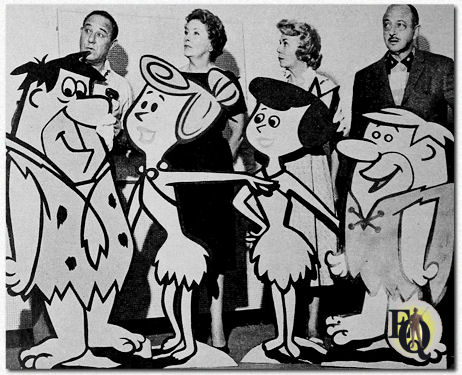 Above: Alan Reed as Fred Flintstone, Jean Vander Pyl as Wilma Flintstone, Bea Benaderet as Betty Rubble and Mel Blanc as Barney Rubble. |
|
“When we were up to the 12th show, Alan developed
cataracts in both eyes. He couldn’t see. We prepared his
scripts with bigger type and more space until,
fortunately, his eyesight improved.” Alan began playing the role in 1960, was a perfect "Fred Flintstone" and reveled in the role. There were many spinoffs from the original in which Reed was involved. He did much work for the Hanna-Barbera Studios. Perhaps the strangest-named character he played was in Audrey Hepburn's Breakfast at Tiffany's (Paramount, Oct 6. 1961) as "Sally Tomato". Although "Puddles Podell" in Marjorie Morningstar (Warner Bros, Apr 24. 1958), the Natalie Wood-starring film, must be a close second! The Reeds reside in a modern ranch style Beverly Hills home above the Sunset Strip. Reeds's special interests include reading, golf and square dancing. (Oct 1963) Alan Reed made appearances in almost every popular series going: The Lucy Show (CBS, Mar 25. 1963), The Beverly Hillbillies (CBS, Nov 11. 1964 - Feb 7 . 1968, min. 2 episodes), Dr.Kildare (NBC, Feb 7. 1966), Batman (ABC, Feb 1. 1967), Green Acres (CBS, Sep 6. 1967 - Apr 10. 1968), Petticoat Junction (CBS, Mar 2. 1968), and everything in between. |
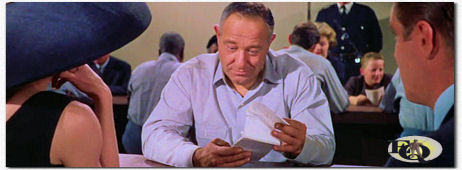 Above: In Audrey Hepburn's Breakfast at Tiffany's (Paramount, Oct 6. 1961) where he was known as "Sally Tomato". |
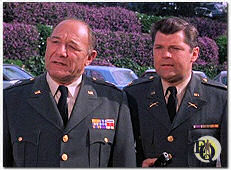 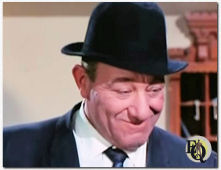 Above left: In a scene from the Batman episode "Penguin Sets a Trend" (ABC, Feb 1. 1967) we see Major Beasley played by Bob Hastings (R), who would later go on to voice Gordon in Batman: The Animated Series and General MacGruder played by Alan Reed (L) Above right: One of his last on screen appearances in an episode of Petticoat Junction called "Bad Day at Shady Rest" as Bandit Lawson (CBS, Mar 2. 1968). |
|
Radio playwright and director Norman Corwin cast Reed as Santa Claus in the
1969 KCET television reading of his 1938 play The Plot to Overthrow
Christmas. He appeared as himself on Johnny Carson's Tonight Show (NBC, Nov 4. 1971). The Hollywood Radio Theatre (Mutual, Oct 9. 1973 - Oct 12. 1973, 4 episodes), The CBS Radio Mystery Theatre (CBS, Oct 7. 1974 - Sep 15. 1975, 2 episodes), He was interviewed on Those Were The Days (Feb 17. 1975) by Chuck Schaden. The actual last time he was actually seen on the big screen was in the comedy The Seniors (Cinema Shares International, Jun 30. 1978) as Professor Heigner. A decade before his death, Reed, a heavy smoker, was diagnosed with bladder cancer which was surgically removed. Although this operation was successful, he later developed emphysema and died at the St. Vincent Medical Center near his home in West Los Angeles on June 14. 1977 of multisystem disease, cardiac failure two months before his 70th birthday. His body was donated to medical science (Loma Linda Medical Center). |
![A photograph of an older, bearded Reed sitting on a sofa. He is much slimmer than in previous photos, this plus the beard indicates that the photo was taken sometime late in Reed's life. (c) Alan Reed Collection [digital resource], Pepperdine University Special Collections and University Archives (Used by permission)](images/Reed_1970s_Pepperdine.jpg) Above: A photograph of an older, bearded Reed sitting on a sofa. He is much slimmer than in previous photos, this plus the beard indicates that the photo was taken sometime late in Reed's life. © Alan Reed Collection [digital resource], Pepperdine University Special Collections and University Archives (Used by permission). |
| All of his characters all sounded different, but they had one thing in common: They all had a touch of Abraham Greenberg, Reed’s grandfather. For all the broad comedy and exaggerated accents, Reed realized that at the heart of every immigrant’s story was buried a deep uncertainty, a throbbing anxiety, a certain confusion about preserving the old world’s values in the new one. As a child, Reed had witnessed these emotions overwhelm his grandfather, and he resented the old man and his ways. As an adult, however, he could turn the maddening into the sublime, recreating one Abraham Greenberg after another and giving his creations the gift of warmth and humor. (9) |
|
Notes: * Alan Reed Bergman's middle name came from his grandfather on his mother's side. Finette's father's name was Myron Reed Walker. All dates for movies are for the first US release. All dates for TV programs are original first airdates. All dates for (radio) plays are for the time span the actor was involved. Facts in red still need confirmation. |
|
Click on Uncle Sam if you think you can help out...!
|
|
Other references |
|
This actor profile is a part of
Ellery Queen a website on deduction.
The actor above played Sergeant Velie in
the
Ellery Queen radio series.
Click Uncle Sam if you think you can help
out...! Many of the profiles on this site have been compiled after very careful research of various sources. Please quote and cite ethically! |
|
Page first published on November 18. 2017 Version x2.1 - Last updated April 24. 2025 |
 b
a c k
t o L i s t o f S u s p
e c t s
b
a c k
t o L i s t o f S u s p
e c t s
|
|
| Introduction | Floor Plan | Q.B.I. |
List of Suspects | Whodunit? | Q.E.D. | Kill as directed | New | Copyright Copyright © MCMXCIX-MMXXV Ellery Queen, a website on deduction. All rights reserved. |